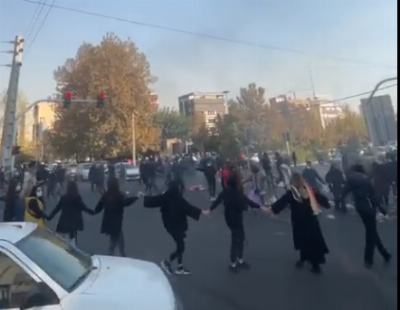Share
Human Rights Voices
While the UN devotes its human rights operations to the demonization of the democratic state of Israel above all others and condemns the United States more often than the vast majority of non-democracies around the world, the voices of real victims around the world must be heard.
Iran, August 13, 2025
Inside Iran’s great ‘spy’ purge: thousands of arrests in brutal crackdown
Original source
Iran has arrested tens of thousands of people after the “humiliated” regime in Tehran ordered security forces to hunt down spies who helped Israel kill the country’s top military leaders.
An appeal to Iranians to turn over “suspicious” people to the police led to thousands of arrests, state media reported, as the country’s top judge said he would deal “decisively and legally” with spies. He spoke a week after Iran executed another alleged spy for Israel.
The crackdown has particularly targeted ethnic and religious minorities in Iran and has drawn condemnation from the UN. Iran has expelled thousands of Afghans, and those arrested have included journalists and human rights advocates, according to the UN.
Iran had been badly humiliated in the war with Israel, which began with a covert Israeli mission that crippled the country’s air defences before a wave of airstrikes that decapitated the Iranian military and killed almost two dozen nuclear scientists. The attacks suggested Israeli intelligence had deeply penetrated the country at the highest levels, while also setting up networks of commando cells who sprang into action during the war.
Israel had released some footage of those commandos as they sabotaged Iranian air defences with drones, allowing Israel to act freely in Iranian space during the war.
A big part of Israel’s success in the conflict was not what its air force did but it was the intelligence penetration and operations on the ground by Mossad agents. “Using a relatively light but significant footprint, they inflicted massive damage,” said Farzan Sabet, managing researcher with the Global Governance Centre.
“My sense is that [the crackdown] is more of a response to the humiliation of this massive infiltration to the system and the country,” he said. “They don’t like to grapple with reality so it’s just easier to do a crackdown.”
The government is also concerned about growing discontent following the war, which underlined its weakness. Israel has encouraged Iranians to rebel, most recently this week in a statement by its prime minister, Binyamin Netanyahu, who called on Iranians to be “bold and brave” and “take to the streets”.
One Iranian dissident told The Times he hoped to see another protest movement in the coming months. “We think there is not much time left for the Islamic Republic,” he said. “Many people didn’t receive their pay cheques and lost all their money in the bank. I believe that in the next few months people will start showing their frustration in the streets.”
Iran has experienced several waves of mass protests over the past two decades, each increasingly longer and more radical.
“The system is very vulnerable,” said Sabet. “They’re not on the brink of collapse by any means … but it’s been a downward trajectory in terms of economic pressure and political pressure.”
Iran has periodically announced the arrests or executions of suspected spies, but it has remained silent on any senior-level moles in its government or security apparatus. It is now believed to have changed intelligence protocols and investigated the leaks, which included up to date information on the whereabouts of the country’s top officials, including the president, and military commanders.
“They have to root out any holes in their system and it’s clearly coming in all layers and levels,” said Sanam Vakil, the director of Chatham House’s Middle East programme.
“Minorities were perhaps easy to round up and to bring in for conversations … What’s more interesting is where are the leaks at the higher echelons of the system? You need all layers of access and clearly we won’t see who has been implicated at the higher levels.”

